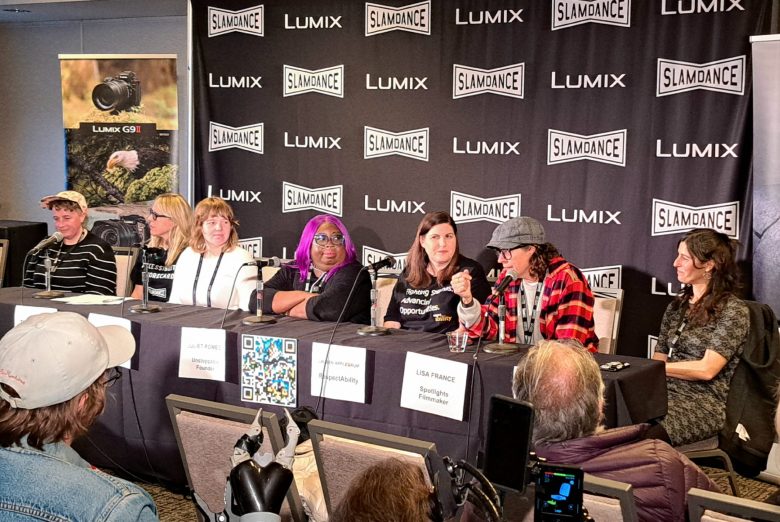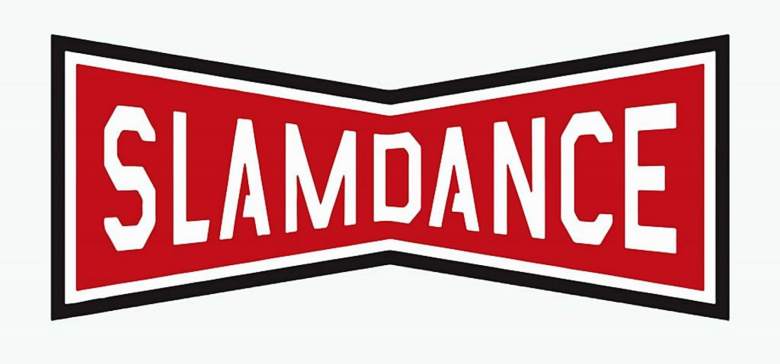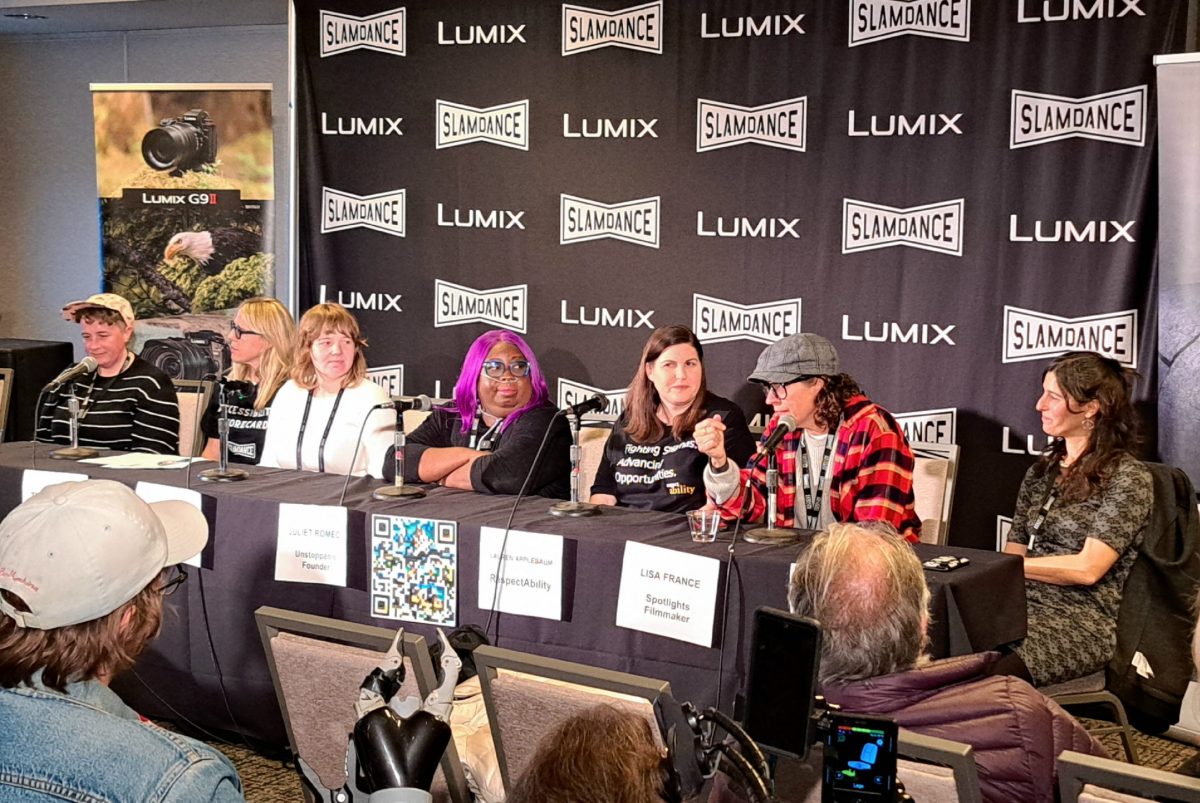
While the coronavirus pandemic wanes, many people are looking forward to things getting back to “normal.”
But people who have disabilities are not so sure they want to go back.
“One of the biggest fears when the world was opening back up was that we would be left behind,” said filmmaker Juliet Romeo, during a panel discussion titled “Goals: DEIA ASAP — Redefining Narratives in Entertainment Now” that took place Saturday at the Slamdance Film Festival’s LUMIX Studio at the DoubleTree by Hilton Hotel Park City. “During the pandemic, although we were all inside, I had never felt more seen in my life.”
DEIA (diversity, equity, inclusion and accessibility) refers to a set of practices intended to ensure people from different socio-demographic backgrounds have representation and are able to thrive in a workforce.
Romeo, who is also the founder of Slamdance’s Unstoppable program, an initiative for and by filmmakers with visible and nonvisible disabilities that debuted in 2021, said COVID-19 gave artists like her a level playing field where people could empathize with people with disabilities.
“(It’s) because they now had to structure their lives in a way that we already interpreted ours,” she said. “Before I was chasing the dream, and now I’m walking alongside. So, once things started to open up my fear was, we can’t go back to what people call normal. Because then we get called ‘abnormal’ again.”
Romeo was just one voice on the panel that was moderated by Taylor Miller, Slamdance Film Festival director. The other participants included:
- Ravit Markus, filmmaker and Slamdance alumni, whose documentary “Nina Is an Athlete,” about Paralympian Nina Gorodetsky, was screened at Slamdance, and whose 2023 documentary “American Pot Story: Oaksterdam” with Dan Katzir, won the festival’s Audience Award.
- Lisa France, another Slamdance alumni, whose 2018 film “Roll with Me” followed Gabriel Cordell, who journeyed by wheelchair from Santa Monica to New York. She is also the producer of Olivia Kuan’s “The Herricanes” that debuted at this year’s festival.
- Lauren Appelbaum, the senior vice president of entertainment and news media for RespectAbility, a nonprofit that works to “create systemic change in how society views and values people with disabilities.”
- Barbara Twist, film producer and executive director of the Film Festival Alliance, a nonprofit that “creates a collaborative global community for mission-driven film festivals.”
- Cassidy Dimon, filmmaker and director of programs, events and accessibility for Full Spectrum Features, an organization committed to driving equity in the independent film industry by producing, exhibiting and supporting the work of women, BIPOC (Black, indigenous and other people of color), disabled and LGBTQ+ filmmakers.
The panel concluded that it would be conducive for the film industry, which includes everything from the big studios to the smallest nonprofit festivals, to continue moving forward.
“2020 made a lot of changes in the DEIA across the board,” Dimon said. “We were learning and building on tools and systems the folks with disabilities have been using for decades. So, there is the fear when people say, ‘OK, we’re all back to normal, so we no longer need to respond to these initiatives,’ and we see studios rolling back DEIA departments. They’re stopping to fund diversity, equity and inclusion.”
And pushing away inclusion not only alienates those with disabilities. It also pushes aside other marginal communities such as BIPOC and LGBTQ+, she said.
“At a time when festivals are struggling to get audiences back, why would you turn your back on a quarter of the population that has buying power?” she said. “I think we’re in this moment where we feel that we could leave a lot of people behind if we don’t start doing something right now.”
One of the reasons for cutbacks is budget-management, according to Dimon.
“People look at their budgets that are shrinking and say, the last thing we added was accessibility, so this is the first thing we’re removing,” she said. “No, accessibility isn’t something you add on.”
France said she has seen some changes for the better in attitudes of certain groups in the industry, especially after one of her first documentaries was picked up by award-winning filmmaker, producer and activist Ava DuVernay.
France became a part of an elite group of women whom DuVernay selected to direct her award-winning TV series “Queen Sugar.”
“Only women directed the show,” France said. “Some of the women have disabilities. They are an array of LGBTQ (and) people of color. (So) it’s a DEIA smorgasbord of delight.”
One of the directors has a nonvisible disability, and experienced a fall, according to France.
“That exacerbated the disability, and no one would help her,” she said. “So the Directors Guild of America said, ‘No. We are going to create a whole new world for people with disabilities.'”
France took it upon herself to write a letter to all of the “Queen Sugar” directors.
“I said, ‘Ava taught us what to do, and we’re all leaders now. When you’re a leader in a community, it’s up to us to not forget where we started.'”
France also said, “Normal to me is the world of humans, and we need to continue to normalize the world of DEIA. “

Opening up about accessibility is the only way things can move forward, especially when it comes to events that include festivals, meetings, parties and galas, said Appelbaum.
“Having those conversations up front is very important, and asking everyone if their event is accessible, or if there’s a different entrance (is necessary),” she said. “You have to ask to get the information and such.”
Appelbaum said event organizers can also go one step further and include accessibility information on invitations or press releases.
“The advice I give organizations, and film festivals should do this, is at the bottom of your invitation write, ‘Have an access need? Contact —’ and have a real name, email and phone number,” she said. “That signals to folks who may have an access need that this organization is open to working with them. While (the organizations) may or may not be able to accommodate you, depending on other circumstances, they will be sure to try as much as humanly possible.”
But events aren’t the only places where accessibility is needed.
RespectAbility has provided consulting services to Amber Sealy’s “Out of My Mind,” a feature about a sixth-grade, nonverbal wheelchair user who has cerebral palsy that premiered at this year’s Sundance Film Festival.
The set was fully accessible, and the lead actress (Phoebe-Rae Taylor) is a girl who uses a power wheelchair, Appelbaum said.
“I’ve worked on other accessible sets, and who does that also help?” she asked.
The answers are costume designers, make-up artists and the camera crew, to name a few.
“Ramps are everywhere,” she said. “Does it cost too much money? Not if you do it from the beginning.”
Another film RespectAbility worked with is Alexander Yellen’s Slamdance film, “Daruma,” which follows wheelchair user Patrick (Tobias Forrest) who enlists the help of a grumpy neighbor and double amputee, Robert (John W. Lawson), to take his 4-year-old daughter, whom he had never met, to live with her grandparents.
“One of our lead actors is only going to the Salt Lake City premiere, because coming to Park City was just too difficult,” Appelbaum said.
One of the ways the public can help event organizers develop accessibility measures is through what is called the Accessibility Scorecard, which was developed by a nonprofit called FWD-Doc: Documentary Filmmakers with Disabilities through a partnership with Film Event Accessibility Working Group (FEAW).
The scorecard can be accessed through a QR code, and a link: https://qart.to/1705556068kWszMf.
The Accessibility Scorecard was made possible with the support of the Film Festival Alliance, in association with 1IN4 Coalition, a group of disabled creatives working in Hollywood.
Dimon had conceived the scorecard, which features a series of questions regarding accessibility.
“It takes 15 minutes (to answer the questions) after your experience at Slamdance, Sundance, Toronto, South by Southwest or wherever you go,” she said. “The festivals who have signed up will get back anonymous, direct feedback. They will be able to see what their audience needs, and they can balance the feedback with their budget and other perspectives.”
Organizers can use the information when planning the next festival, and they can also use it to get more money to fund accommodations, Dimon said.
“The results will be utilized to improve the film events experience and create a more inclusive field, accessible for all,” she said.
Markus has seen what thinking ahead can accomplish while filming “Nina Is an Athlete.”
“The film is about three people, but the fourth character is the beautiful, fully accessible house that the star of my film lives in,” she said. “It was designed by her husband, who is an architect. He said he just designs for Nina, and if it works for her, then it’s going to work for most people. And it was very easy to bring the (filming) gear into the house and move from room to room.”
Markus also had the opportunity to attend the Paralympics to film Gorodetsky compete. “It was one of the most amazing events of my entire life, and there’s a mother in the film who says, ‘It’s not me who needs fixing. Fix the world. I’ll be comfortable going anywhere I want,'” she said.

